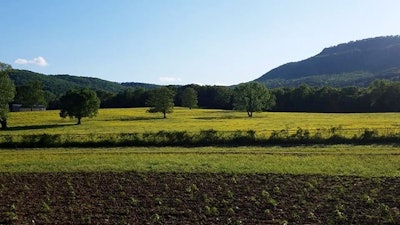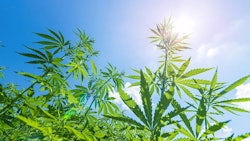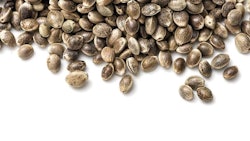
Kindle Lancaster and Terry Roston, partners in Nebo Mountain Hemp Co. in Dardanelle, Ark., are out in the field on May 11, working to plant their 40,000 seeds and trying their best to ignore the rain in the forecast this spring. They’re looking forward to a smaller, more productive hemp crop than they grew last year.
And while the economic pressures of the coronavirus outbreak delayed their seed tray shipments by several weeks, they’re looking forward to a busy season now. The hopeful successes of 2020 are built on lessons learned in 2019.
“We chose not to use feminized seed,” Lancaster says. “We’re using our second-generation seed that we grew ourselves last year.” The goal is to get better germination rates on this crop—something closer to 80% as opposed to the 40% they saw in 2019. They sourced hemp seeds from Oregon last year, and they’re planning to develop their own genetics during this upcoming season.
It’s all part of the steep learning curve that bridges planting seasons in the nascent hemp industry. Nebo Mountain Hemp Co. (formerly known as Helping Everyone Make Progress) is scaling back its hemp operations just a bit, while hoping to stretch the crop’s yield further this fall. Roston says that most Arkansas hemp growers lost money on the deal in 2019, and the off-season has been a chance to reconfigure business models and rethink cultivation strategies for what is looking once again like a fairly rainy spring.
“It was a weird year for hemp [last year], anyway, with the way the market crashed down to basically nothing,” Roston says. “The price of seeds was super high at the beginning of the year, and then at the end of the year the final distillate didn’t have much value at all—if you could find a buyer for it.”
The historic flooding of the Arkansas River didn’t help; Dardanelle is located right on the riverbank, and portions of Nebo Mountain Hemp Co.’s property were inundated. In certain places, the team couldn’t plant seeds until late July. Beyond the unfortunate bout with Mother Nature, Roston says the biggest challenges once the seeds were in the ground involved harvest, drying/storage and theft.
To solve those problems, the Nebo Mountain team is setting up a drying, storage and processing facility in Clarksville, Ark. The facility is centrally located to be of use for hemp growers in Oklahoma, Missouri, Texas and, of course, Arkansas.
“It’s such a huge, labor-intensive thing,” Roston says of the process between harvest itself and the drying stage. “You’ve got to go out to the field, cut these plants down, handle them three to four times to get them ready to hang up in a drying facility for eight to 10 days, and then pluck them down and get it ready for pelletizing. We’re trying to streamline that entire process.” The idea is to cut the wet crop with a round baler and then bring the biomass straight to the Clarksville facility for pelletizing right away.
The processing facility will be open by early September and ready for harvest this fall.
As far as theft, it was a recurring event that surprised Lancaster and Roston. On four occasions, thieves crossed the property line and stole hemp plants. Early in 2019, a few plants were pulled, but closer to harvest the thieves grew more brazen. Entire plants were stripped from the ground.
“They literally took some of our largest plants,” Lancaster says. “That just shocked me.”
She says it’s indicative of a broader gap in how the general public has come to understand the state-legal cannabis industries (“medical marijuana” or “adult-use marijuana”) and the federal hemp industry that was formally legalized under the 2014 and 2018 Farm Bills. Lancaster and Roston believe that the thieves assumed they were getting away with THC-rich plants. (The Yell County Sheriff’s Office stepped in and ultimately arrested four adults on the fifth theft attempt; their trials are set to begin soon.)
Looking ahead, Lancaster and Roston are planning to develop some sort of education center on their farm property. Their goal is to bring folks to Nebo Mountain Hemp Co. for tours—something to engage the public and educate the potential consumer base on what, precisely, hemp is. The Nebo Mountain team is planning to develop CBD goat soap, dog treats and pain relief products for sale in their retail shop in Dardanelle.
In the short-term, Lancaster and Roston are hoping to see the market relieve the price point pressure. It’s a matter of survival for many farmers in Arkansas and elsewhere, all of whom are eager to see a dynamic market lift up agricultural businesses at a precarious time across the entire country.
“We’d like to create a co-op of growers, where we can offer them incentives with our processing facility and with our genetics,” Lancaster says. “That’s another way that I feel we will educate the public and the Arkansas farmer.”

























